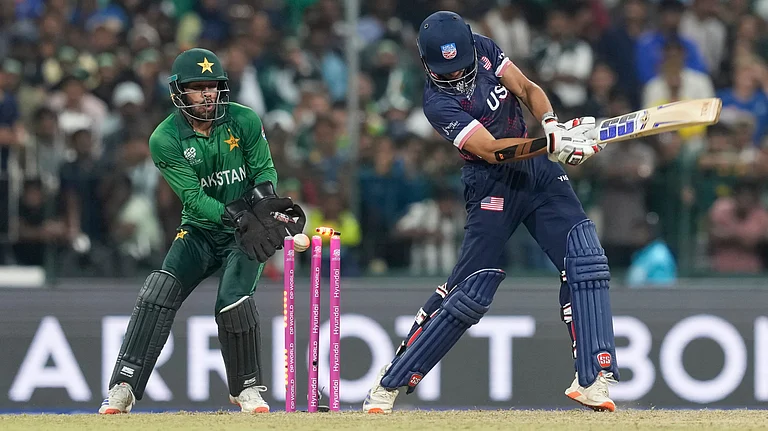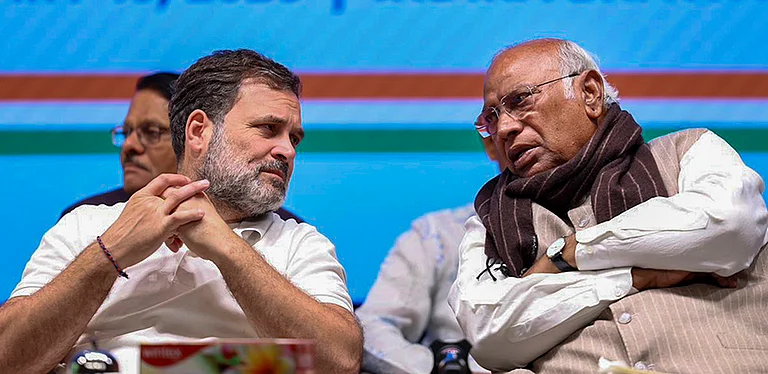A small lane near the Kupwara bus stand leads to a shopping complex at its dead end, where Bakhtawar Boutique stands out. It is easy to find as all the other shopkeepers around the bus stop know its exact location. Bakhtawar Boutique is famous because it is run by Pakistani women.
They came from Pakistan and Pakistan-occupied Kashmir (PoK) along with their husbands under the amnesty scheme of 2010, and got stuck in the Valley. Now, they are nowhere people—the government doesn’t give them citizenship, nor are they allowed to go back to Pakistan or PoK.
Saira Javid, 43, who runs Bakhtawar Boutique, is from Karachi. It was in Pakistan that she married Javid Ahmad Dar of Lolab area of Kupwara in 2004. Like hundreds of others from Kashmir, Javid had gone to Pakistan in the 1990s to get arms training, but he opted to stay in PoK instead of coming back to the Valley as a militant through the LoC. He set up a grocery shop in Muzaffarabad.
Saira doesn’t like to call Javid an ex-militant “Often we are called wives of ex-militants and our children taunted as those of former terrorists. You should understand the situation in which people like my husband left this place and settled in Pakistan. He was only 14 when he crossed to PoK from the Indian side. They were living as refugees there and it is better to call them just that,” she says.
Like refugees, Javid was deeply in love with the Kashmir of his childhood. Three years after their marriage he convinced Saira pay a short visit to the Valley to meet his parents. She agreed. In January 2007, Javid and Saira along with her two children, one-and-half-year-old Bakhtawar and two-year-old Sheroz, took the Wagah route to visit the Valley.
“We came here in January in biting cold, and after a while when I told my husband that we should return, I found that my documents were missing. Later I learnt he had discarded them deliberately after we crossed Wagah as he wanted me to stay here forever,” says Saira.
As she was on a month-long visa to India, she couldn’t manage to get her documents in order within 30 days. She was arrested along with her husband and children, and sent to the Central Jail in Srinagar. Four months later she and her children were granted bail. But her husband remained in jail for two more months.
After that, she went to the Pakistan Embassy in New Delhi to get her documents. Once she got the documents, she approached the police. The police told her that her case is pending in court under Section 14 of the Foreigners Act.
The case continued for eight years, after which she was finally acquitted. She then approached the police to get clearance to travel to Pakistan, but she wasn’t allowed to leave the Valley. “Since then we are in a sort of jail in Kashmir. We have been projected in the media as if we were living in hell in Pakistan and we have come to heaven now. All we are asking is to get us out of this heaven,” she says.
For the last 14 years she has been struggling to return to her home in Pakistan. She and many more families like hers have been duped by touts who promise to make them cross over to Pakistan through the LoC. “This has happened many times. They take money from us and leave us on the road. During these 14 years, around 10 of my relatives have died. My father died last year and I couldn’t do anything except watch his funeral later on phone. Seven years ago my younger brother got engaged to a girl. He has been waiting for my return to get married,” she says. But all this she has borne with great courage.

A protest demanding life and dignity.
What haunts her every day is the death of a fellow-traveller Shahida in 2014. Shahida Lone, along with her husband Abdul Majid Lone, returned through Nepal to Kashmir in 2012 under the rehabilitation policy. At her husband’s hometown in the Ganderbal area, Shahida and her family had no place to live as the family didn’t want Abdul Majid back. They were putting up in a tin shed outside her in-laws’ house.
Shahida, who had been living a decent life in PoK, now had no contact with her parents and siblings to tell them about her woes. Soon the marriage soured and there would be frequent fights at home, and one day in 2014 an argument with her husband went out of hand. He threw her out of their tenement and she had nowhere to go. She couldn’t bear it, she poured kerosene over her and lit a match. “I also died on that very day thinking we will all meet the same fate one day,” says Saira with tears in her eyes.
Why are women like Saira and Shahida made to lead this terrible life? Who can they go to save them from their travails? What is the genesis of this inhuman treatment?
It all started in 2010, when the Omar Abdullah government announced the rehabilitation policy, which was touted as one of biggest confidence-building measures between India and Pakistan. According to the policy, former militants settled in PoK and Pakistan could return through four entry points—Poonch-Rawalakote, Uri-Muzaffarabad, Wagah (Punjab) and Indira Gandhi International Airport, New Delhi. The government advertised the policy without specifying its rules. There were many Kashmiris settled in PoK and other areas who availed of it to return. Officials claim that the government was very choosy in granting permission—of over 1,200 applications, only 350 were accepted.
The policy wasn’t thought through and had many flaws. For starters, the government in Jammu and Kashmir failed to figure out that the youths who crossed the LoC in the 1990s were not young anymore, they were married men with wives and children. The policy hinted that the PoK returnees would be provided travel documents to visit Pakistan and also that they will be given incentives to start a new life in India. The plan was, on reaching Kashmir, they would have to report to the concerned police station. As a formality, they would be arrested, and later released on bail. They had to report to the police before travelling to any other part of the country.
But once in Kashmir, most of them couldn’t find any job and they didn’t get any monetary assistance from the government to start a business. Instead, they found themselves stateless people with no documents. “In the process, the women suffered the most. Men had families and relatives here. We had none. Many turned insane and some like Shahida committed suicide,” says Saira.
Zarina from Muzaffarabad is one such woman in Kupwara. She couldn’t bear being away from her parents and went into depression. “She is now roaming from one place to another. Even her husband has left her. Won’t you turn insane if you have a quarrel with your husband and then you have nowhere to go?” asks Bushra Farooq, 36, who came to Kashmir along with her husband Altaf Ahmad Dar and two children in 2012.

Some of the women address the media.
“My husband was settled in Muzaffarabad after coming through from the LoC. His family came to ours in 2008 seeking my hand for him. Since he had his own business, my family agreed to the marriage proposal,” says Bushra. But the rehabilitation policy of 2010 turned everything upside down for many families married to Kashmiris in Muzaffarabad. “Once the policy was announced, many husbands would blackmail their wives, threatening them they will take the children and leave for Kashmir. We were left with no option but to accompany them. Many men were also desperate to see their parents and go back to their childhood homes,” she says.
In her case, her husband surrendered before the police at the Pattan area of Baramulla. He was in the lock-up for a few days and then got bail. For some time everything was fine. Then arguments between husband and wife became routine and he finally divorced her, leaving her and their two young daughters to fend for themselves. Having nowhere to go, she turned to Saira, who had opened Bakhtawar Boutique especially to help such girls.
“On March 8, International Women’s Day, we addressed a press conference in Srinagar to convey our pain. The government announced the rehabilitation policy and it has played havoc with our lives. We need documents to see our loved ones. Some of us are divorcees, some of us are widows. We have no one here. Why doesn’t the government let us go back to Pakistan?” asks Bushra. “We have met the chief ministers, governors, and all officials. We have asked them to give us citizenship with travel documents or a Pakistani passport with short-term visas to visit Pakistan. Or let them deport us. But no one responds to any of our demands. This is a humanitarian issue. It is not an issue about Hindus or Muslims. It is not an issue of India and Pakistan.”
Nusrat, 35, from Muzaffarabad came to Kashmir with her two children for a brief visit two months after her marriage in 2008. “My husband divorced me and I am living with my two children here at Kupwara. I work the whole day to earn something for myself. My ex-husband didn’t even look back to see what happened to his children,” she says. Her family in Muzaffarabad thinks Nusrat is living happily in the Valley. She has not told them about the divorce and that she is struggling to make ends meet.
At the Pattan area of Baramulla, Toiba Ejaz. 33, too is waiting to get back to Pakistan. She was married to Ejaz Ahmad, who was working as a salesman. Ejaz had crossed the LoC in 2001 and settled in Pakistan with his uncle there. Hailing from Abbottabad, Toiba married Ejaz in 2009 and then continued her study completing her MBA from the Hazara University at Manshera. Life was going well till the government announced the rehabilitation policy and she was forcibly brought to the Valley through Nepal. “I was promised that within the six months my passport will be returned to me. Nothing has been given to us,” she says. In all these years many of her family members have died, including two uncles and an aunt.
While Saira and Toiba from Pakistan can still be called foreign nationals, somebody from PoK cannot be a foreigner. In 1994, a resolution of the Lok Sabha and the Rajya Sabha described the entire territory of Jammu and Kashmir, including PoK, as an integral part of India. In fact, the Jammu and Kashmir Assembly has 24 seats reserved for the region. Legally, they cannot be arrested under the Foreigners Act. But women like Bushra Farooq and Nusrat from PoK are slapped with cases of foreign nationals attempting to illegally enter India and are not granted any official documents. The abrogation of Article 370 has made no difference to these women. They are stateless, helpless and fateless.


























